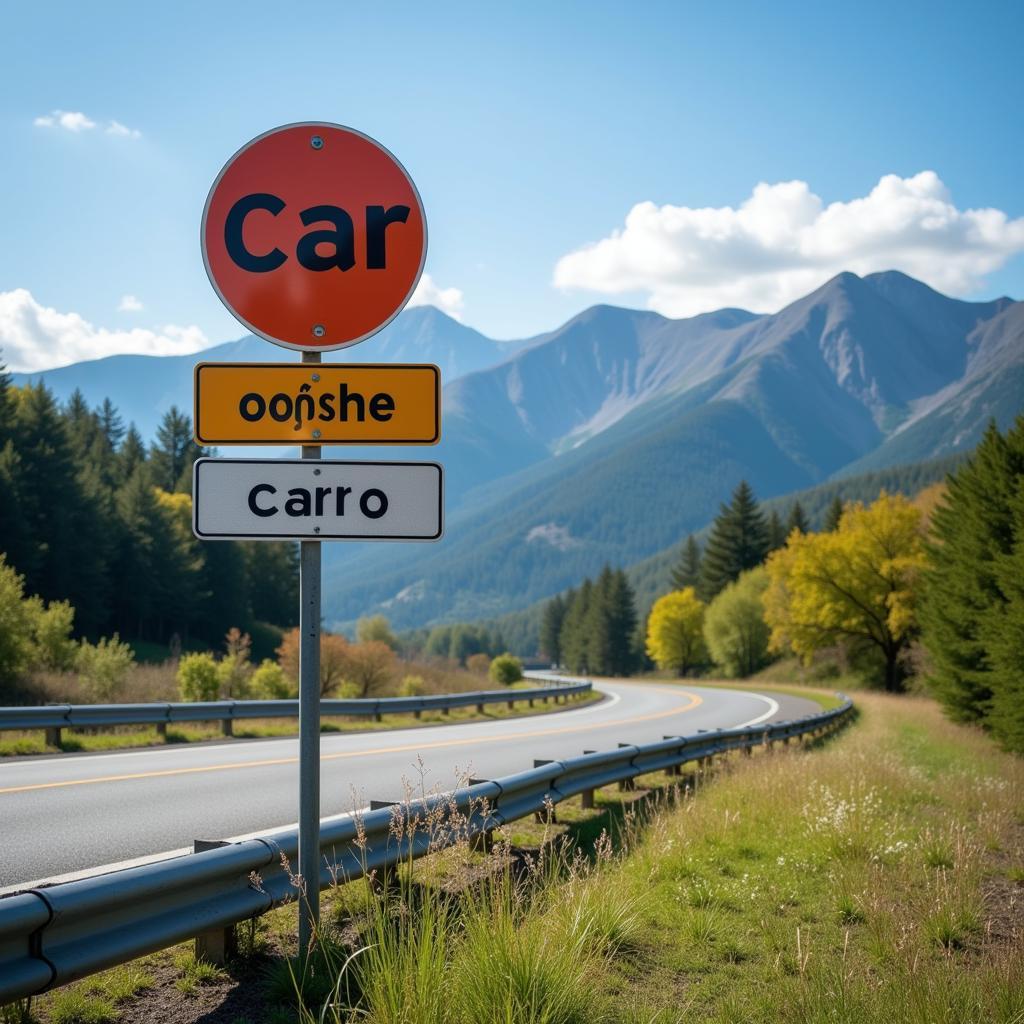Learning how to say “car” in Spanish is a great starting point for anyone interested in the language or planning a trip to a Spanish-speaking country. It’s a simple yet essential word that you’ll likely use frequently. But the answer isn’t as straightforward as you might think. There’s more to it than just one word! Let’s dive into the different ways to say “car” in Spanish and explore some related vocabulary.
 Spanish Translation of Car on a Road Trip Sign
Spanish Translation of Car on a Road Trip Sign
The Most Common Way to Say “Car” in Spanish: Coche
The most common and widely understood translation of “car” in Spanish is coche. This term is generally used in Spain and is the go-to word for most everyday conversations. If you’re unsure which word to use, coche is a safe bet. Think of coche as the equivalent of “car” in English – simple, straightforward, and universally recognized.
What if you’re not in Spain? While coche is widely understood, other terms are preferred in different regions. Let’s explore those next.
Other Ways to Say “Car” in Spanish: Auto, Carro, and Automóvil
While coche is king in Spain, other Spanish-speaking countries have their own preferred terms. In Latin America, you’ll often hear auto or carro. Auto is a shortened version of automóvil, which is another word for “car” but sounds more formal. Think of it as the “automobile” of Spanish. Carro is another common term, particularly in some parts of Latin America, though it can also refer to a cart or wagon in some contexts. So, while coche, auto, carro, and automóvil all mean “car,” using the right term in the right region shows you’ve done your homework.
How Do You Say “Cars” in Spanish?
Now that you know the singular forms, let’s talk plurals. To make coche plural, you simply add an “s” to make coches. The same rule applies to auto (autos) and carro (carros). For automóvil, the plural is automóviles. Easy, right?
Beyond the Basics: Related Car Vocabulary in Spanish
Knowing how to say “car” is just the beginning. Here are some other useful car-related terms:
- El volante: Steering wheel
- Los frenos: Brakes
- El acelerador: Gas pedal
- La gasolina: Gasoline (gas)
- El aceite: Oil
- Las llantas: Tires
Learning these additional words can greatly enhance your communication skills, especially if you’re driving or dealing with car-related issues in a Spanish-speaking country.
Choosing the Right Word: Context is Key
While knowing the various translations is crucial, understanding the context is equally important. For instance, carro might be perfectly acceptable in everyday conversation in one country but sound unusual or even have a different meaning in another. Pay attention to the local dialect and usage to ensure clear communication.
car dealerships with spanish staff
“Understanding the nuances of regional dialects is crucial for effective communication,” says Maria Sanchez, a renowned linguist specializing in Spanish dialects. “Using the appropriate term for ‘car’ can make a significant difference in how you are perceived.”
How Do You Pronounce “Coche”?
The pronunciation of coche is approximately “KO-cheh,” with the emphasis on the first syllable. Remember that Spanish pronunciation differs from English, and practicing with native speakers or online resources can help you perfect your accent.
“Immersion is key to mastering any language,” adds Dr. Juan Garcia, a language acquisition expert. “Even simple phrases like ‘coche’ can sound more natural with regular practice.”
Conclusion: Mastering “Car” in Spanish
Knowing how to say “car” in Spanish is more than just memorizing a single word. It’s about understanding the nuances of regional dialects and choosing the appropriate term for your context. Whether you’re using coche, auto, carro, or automóvil, knowing these variations will enhance your communication skills and demonstrate your cultural sensitivity. Now you’re ready to hit the road and confidently talk about cars in Spanish!
savannah car rental in savannah ga
FAQ
- What’s the most common way to say “car” in Spanish? Coche.
- What are some other ways to say “car” in Spanish? Auto, carro, and automóvil.
- How do you say “cars” in Spanish? Coches, autos, carros, and automóviles.
- Is there a difference in meaning between these words? While they all mean “car,” regional preferences and slight nuances exist.
- How do you pronounce “coche”? Approximately “KO-cheh”.
- What are some other useful car-related terms in Spanish? El volante (steering wheel), los frenos (brakes), el acelerador (gas pedal), la gasolina (gasoline), el aceite (oil), and las llantas (tires).
- Why is it important to know the different ways to say “car” in Spanish? It improves communication and demonstrates cultural sensitivity.
When you need support, please contact WhatsApp: +1(641)206-8880, Email: [email protected] Or come to the address: 276 Reock St, City of Orange, NJ 07050, United States. We have a 24/7 customer service team.


